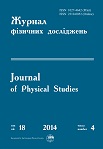DOI: https://doi.org/10.30970/jps.19.4001
FUNCTIONAL-STOCHASTIC METHOD OF CORRELATIONS RESEARCH IN MANY-PARTICLE SYSTEMS
K. Pechars'kyi
Lviv Polytechnic National University
12, Bandery St., Lviv, UA--79013, Ukraine

|
Journal of Physical Studies 19(4), Article 4001 [14 pages] (2015)
DOI: https://doi.org/10.30970/jps.19.4001 FUNCTIONAL-STOCHASTIC METHOD OF CORRELATIONS RESEARCH IN MANY-PARTICLE SYSTEMSK. Pechars'kyi
Lviv Polytechnic National University |
 |
The paper deals with an approach to the study of classical systems of interacting particles including distribution functions using random field theory and integration following the Wiener measure. For a Liouville distribution function, statistical functionality is determined for which a string of equations in the Wiener space similar in shape to the Bogoliubov chain of equations for the distribution functions in the phase space is derived. With the use of the development of statistical functionals included in the output string of equations in a row built by Wiener, in ``transition'' from the Wiener into the phase space, corresponding approximations for the different functions of the particles are determined, for which systems of linear differential equations are derived. The solution to the equation for the zero approximation of the one-particle distribution function represents the local equilibrium distribution, which, when $t\rightarrow\infty$, enters the well-known Maxwell function. All the solutions to homogeneous equations for different approximations of the one-particle distribution function if $t=0$ are the same, which makes it possible to determine the unknown two-particle approximation, three-particle, etc. distribution function at $t=0$. It is also indicated separately that the Bogoliubov chain of equations can produce a sequence of closed systems of linear differential equations matching the systems discussed in this paper. In the case of the statistical equilibrium all time derivatives for all approximations of the distribution function equal zero, and the time-independent functions fall into the product of two independent functions of the coordinates and impulses. The equations obtained for the distribution functions of certain approximations are easily solved. For the zero and first approximations of two-particle distribution function we obtain the known values. For the second approximation of the distribution function an expression is obtained in which one of the components is divergent, but in the combination with the following addend of the same order their sum is zero - in accordance with the general requirements for orthogonal expansions of the stochastic functional, following which the next approximation is finite. For the third approximation of this very distribution function is an expression that consists of 214 different types of addends by different amounts of the Mayer functions' products. Given the above-mentioned requirements for the orthogonal statistical functional expansion, the third approximation takes finite values too.
PACS number(s): 05.10.Gg